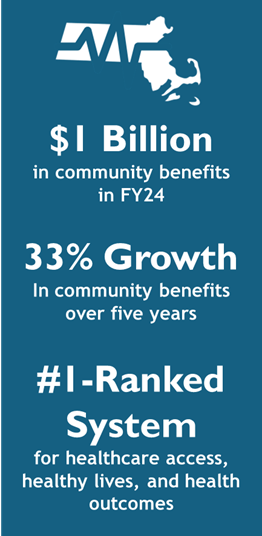Hospitals Answer Rising Demand for Community-Based Care with Over $1 Billion in Local Investments

For second straight year, Massachusetts hospitals pass the $1 billion mark for programs that address health disparities, social needs, and access to care in neighborhoods across the commonwealth.
BURLINGTON, MA – August 18, 2025 – As two-fifths of the commonwealth’s residents reported difficulty accessing care, Massachusetts hospitals devoted more than $1 billion to community-based programs in FY2024, according to the Attorney General’s new report. As local healthcare needs have grown, hospitals’ community benefits investments have increased by 33% over the past five years. It is the second straight year their contributions have topped $1 billion.

Hospital-funded “community benefit” programs have become an increasingly vital part of the state’s healthcare infrastructure. Hospitals undertake an extensive outreach process with their communities and local partners – such as schools, faith-based groups, and nonprofits – to identify the specific health needs in their area. They also follow the Attorney General’s guidelines, which include priorities for communities in every region.
From there, hospitals invest in programs that make a difference – well beyond the walls of their facilities. In partnership with local organizations, they have created mobile health vans for neighborhood health screenings, launched nutrition and chronic disease management programs close to patients’ homes, rolled out initiatives focused on addiction treatment and violence prevention – among dozens of other programs aimed at addressing the real-time needs of their service areas. All of these programs come at no cost to the residents being served, health insurers, or the government.
“As our communities face continuing disparities in healthcare access, the Community Benefits program fills a gap in community health by encouraging our hospitals and HMOs to use their resources to creatively tackle pressing public health issues across the commonwealth. I am encouraged to see Massachusetts hospitals and HMOs developing programs to help our residents access services that improve their social determinants of health.”
Attorney General Andrea Joy Campbell
These community investments are taking place as hospitals confront extraordinary pressures, including escalating costs, tight capacity constraints, and persistent workforce shortages. Adding to the strain, the Health Safety Net, which funds care for low-income, uninsured, and underinsured patients at hospitals and community health centers, is projected to face a $290 million shortfall in FY2025, the largest deficit in the program’s history. This gap, shouldered solely by hospitals, is compounding the financial stress already threatening hospitals’ long-term sustainability.
“Our hospitals don’t just heal patients and fuel Massachusetts’ economy; they open doors for healthier lives in every neighborhood across the commonwealth. These findings are a powerful reminder that, even through the profound challenges today’s providers and patients are enduring, hospitals have only expanded their mission to invest in communities and take on some of the biggest healthcare challenges of our time. Every one of these dollars has touched a life, made care more accessible, and helped us manage downstream healthcare costs in our state.”
Steve Walsh
President and CEO,
Massachusetts Health & Hospital Association
Among the contributions spotlighted by the Attorney General’s Office for 2024:
- Brigham and Women’s Faulker Hospital’s partnership with the Manning School in Jamaica Plain established programs to enrich students’ wellness curriculum, encourage early awareness of how to foster good health, and help students deal with outside factors that may interfere with their health. In FY24, more than 125 students in grades 1-4 received four health classes per month, over 100 students participated in health career lessons, and students in grades K-3 received garden lessons to learn about growing food, life cycles, and healthy foods.
- Heywood Healthcare, in partnership with the CHNA9 Health Equity Partnership, established a Maternal Care Hub of North Central MA, comprised of members representing various sectors, including healthcare, behavioral health, domestic violence, nutrition, doulas, political leaders, and community members from diverse backgrounds to inform and support maternal health strategies and enhance access to high quality, culturally competent maternal care.
- Lahey Hospital & Medical Center partnered with the Burlington Police Department to provide funding to support a mental health clinician as a substance use coordinator to provide outreach to persons identified by police as having substance use issues. In FY24, the clinician assisted 191 individuals and families.
MHA has catalogued additional “Commitment to Community” hospital contributions here. These efforts helped Massachusetts earn the #1 Health System Ranking from the Commonwealth Fund in 2025 – including in areas such as access and affordability, healthy behaviors, and health outcomes
Hospitals will file their FY2025 community benefits reports in spring of 2026. Read more about hospital community benefits at mhalink.org and on the Attorney General’s webpage.


 Massachusetts Health & Hospital Association
Massachusetts Health & Hospital Association